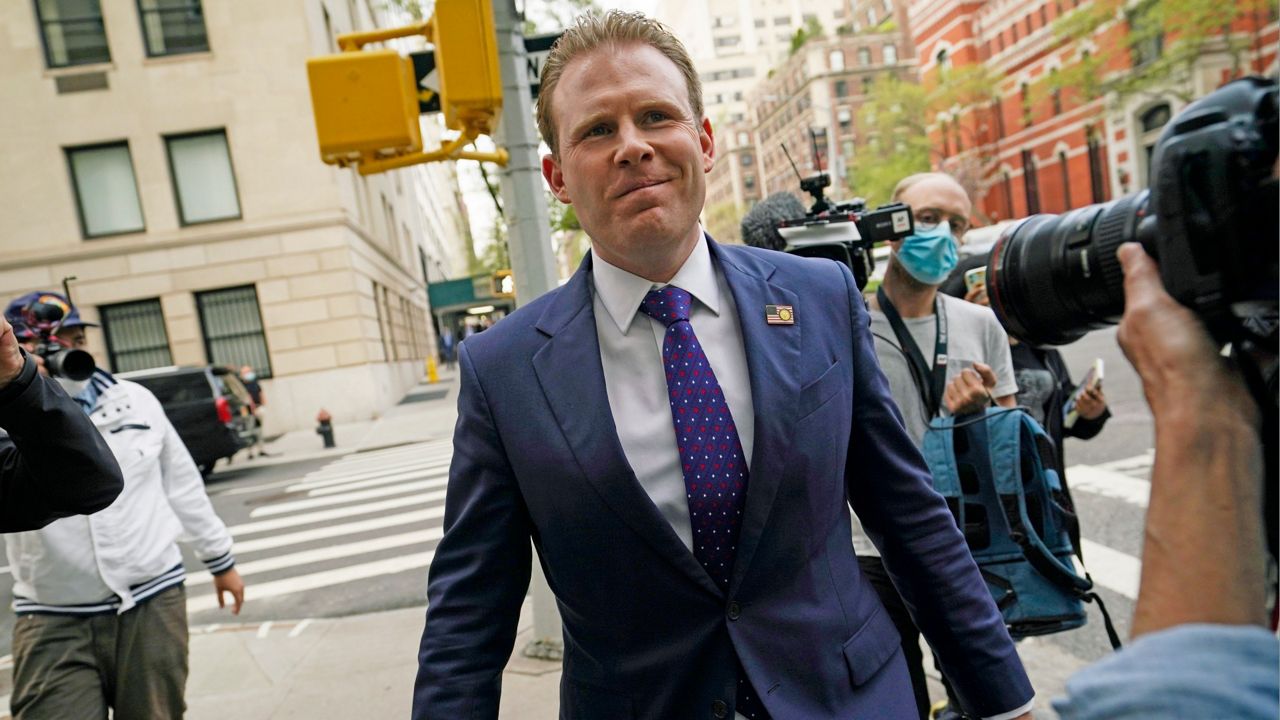If New York voters are wondering whether there will be a Republican primary for governor, the answer at this point is most likely "yes."
And if voters are wondering whether the primary could be a heated one, look no further than the exchange between Republican gubernatorial hopeful Andrew Giuliani and veteran election law attorney John Ciampoli.
Giuliani on Friday appeared at a state Board of Elections hearing that ultimately recommended he be approved for the statewide ballot. But minutes into the meeting in which Ciampoli, representing rival Republican Lee Zeldin's campaign, began challenging Giuliani's petition signature, gave way to this exchange.
"It seems like you're wasting our time and the state's time, Mr. Zeldin's counsel," Giuliani said. Ciampoli shot back, "Well, I've got no problem wasting your time."
And if New Yorkers are really wondering if the gloves are off, look no further than the statement from the Zeldin campaign soon after, accusing Giuliani of election law violations.
"Floundering in polls that have Congressman Zeldin beating Andrew Giuliani by over 30 points, while Giuliani may be eager to put on his next clown show in a courtroom, Congressman Zeldin is interested instead spending next week and beyond traveling across New York meeting voters as he’s been doing for the past year of this campaign," a campaign spokeswoman said. "It is impossible to outwork him."
Republican officials in New York — from state Chairman Nick Langworthy to local members of the state Assembly — believe this year is their best chance in a generation to recapture the governor's office, ending a 20-year statewide election drought in a very blue state.
Voters are increasingly concerned about public safety and crime, and a plurality of voters in a Siena College poll this week said they would prefer a generic "someone else" instead of giving Gov. Kathy Hochul a full term. Her handpicked lieutenant governor resigned amid corruption charges, and Democrats are squabbling over whether to remove him from the ballot.
Further boosting Republican hopes down ballot, the Democratic-drawn maps for the U.S. House and state Senate were rejected as unconstitutional by the state Court of Appeals this week.
Hochul faces U.S. Rep. Tom Suozzi and New York City Public Advocate Jumaane Williams in a party primary.
But a primary is likely looming for Republicans as well. Giuliani's petitions passed the hearing on Friday, and so did those of former Westchester County Rob Astorino. The party's nominee for governor in 2014, Astorino is now running as an outsider after Zeldin secured the overwhelming majority of the party's delegates at the February convention.
"To earn this in the democratic manner that we have rather than be the product of a backroom deal somewhere in this town, it feels pretty good," Giuliani said after the hearing.
Giuliani said he's eager to hold multiple debates with his fellow Republican candidates, but singled out the Zeldin campaign for the challenges.
"These are Cuomo tactics, we're overcoming them, we continue to overcome them. He's going to have to debate us in June," he said.
Insurgent primaries can be successful. The last was in 2010, when businessman Carl Paladino defeated former U.S. Rep. Rick Lazio in a gubernatorial nominating contest.
The full state Board of Elections must still grant final approval for Astorino and Giuliani early next week. But the weeks of challenges were met with withering critiques from Republicans running for governor.
"Congressman Zeldin is basically wasting an enormous amount of time and money and resources fighting the will of 90,000 Republicans who signed these petitions in aggregate who wanted a primary just to protect himself as a candidate," said businessman Harry Wilson, the latest entry into the race.
The petitioning process is a complicated and costly one for candidates running for office in New York unless they receive a state party committee's official designation. Wilson, who is using his own fortune to fund his campaign, says it's a process that needs to change.
"Why do we have that system?" Wilson said. "It's a protection mechanism for insiders."
